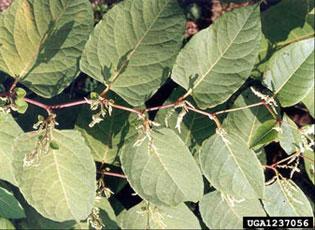Fallopia japonica (Houtt.) Ronse Decr. (ITIS)
Japanese knotweed, fleeceflower, Mexican bamboo, huzhang
Polygonum cuspidatum Siebold & Zucc.; Reynoutria japonica Houtt.
Asia (Stone 2010)
Late 1800s (Stone 2010)
Introduced as an ornamental (Stone 2010)
Crowds out native species (Stone 2010)

Japanese knotweed, foliage
Photo by Jack Ranney; University of Tennessee
Find more images
Distribution / Maps / Survey Status
All Resources
Selected Resources
The section below contains highly relevant resources for this species, organized by source.
Council or Task Force
Partnership
Federal Government
International Government
State and Local Government
Academic
Integrated Taxonomic Information System. Fallopia japonica. [Accessed Sep 16, 2023].
Stone, K.R. 2010. Polygonum sachalinense, P. cuspidatum, P. × bohemicum. In: Fire Effects Information System. U.S. Department of Agriculture, Forest Service, Rocky Mountain Research Station, Fire Sciences Laboratory.
